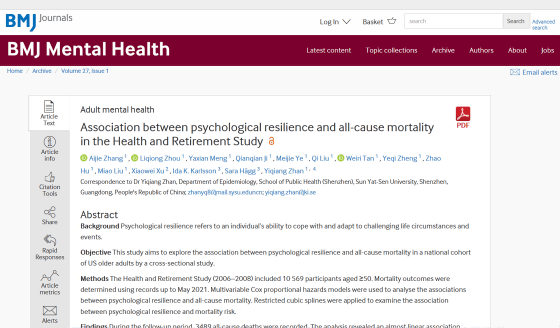It turns out that people with high resilience live longer

In psychology,
Association between psychological resilience and all-cause mortality in the Health and Retirement Study | BMJ Mental Health
https://mentalhealth.bmj.com/content/27/1/e301064

People with greater mental resilience may live longer, study finds | Mental health | The Guardian
https://www.theguardian.com/society/article/2024/sep/03/people-with-greater-mental-resilience-may-live-longer-study-finds
People with high resilience live up to ten years longer - Earth.com
https://www.earth.com/news/people-with-high-resilience-live-up-to-ten-years-longer/
In life, in addition to everyday hardships such as 'not being able to submit my homework in time' or 'being scolded at my part-time job,' we also face major hardships such as 'my company went bankrupt' or 'I lost a loved one.' Resilience is an important ability for overcoming such adversity, and people develop resilience at various stages of life.
In recent years, resilience has been attracting attention in various fields, but it was not clear whether resilience is associated with a lower risk of death. A research team from Sun Yat-sen University in China analyzed data from the Health and Retirement Study (HRS) , a large-scale survey of American adults aged 50 and over.
The HRS was first launched in 1992 and records information on participants' economic status, health status, marriage and family status, and follows up every two years. In this study, data from 10,569 participants was examined between 2006 and 2008, when questions about resilience were first asked. Participants were followed up until May 2021, and 3,489 people died of any cause during the average follow-up period of 12 years.
Resilience was measured using items such as 'perseverance,' 'calmness,' 'sense of purpose,' 'independence,' and 'the awareness that there are experiences that need to be faced alone,' and was scored on a scale of 0 to 12. The average score for all participants was 9.18.

When the researchers analyzed the relationship between resilience scores and risk of death in a model that adjusted for age, sex, race, and body mass index (BMI), they found that a higher resilience score was associated with a lower risk of all-cause mortality. This association was stronger in women than in men.
When participants were divided into four quarters based on their resilience scores, the 10-year survival rate was 61% for those in the lowest score (0-25%), 72% for those in the 26-50% score range, 79% for those in the 51-75% score range, and 84% for those in the highest score range (76-100%).
Compared with the lowest 25% of people, the highest 25% of people were 53% less likely to die in the next 10 years, a trend that remained statistically significant after controlling for diseases such as diabetes, heart disease, stroke, cancer and high blood pressure, and persisted even when accounting for smoking and other health-related behaviors.

The researchers caution that their findings are based on observational studies and do not reveal whether there is a causal relationship between resilience and reduced mortality risk, and do not take into account potential influences such as hormones, genetic factors or childhood adversity.
The research team added, 'Various factors, including meaning in life, self-rated health, and satisfaction with social support, may influence psychological resilience. Evoking these positive emotions may enhance the protective effect of psychological resilience and mitigate the negative impact of accumulated adversity on adult mental health. These findings highlight the potential effectiveness of interventions aimed at promoting psychological resilience to reduce mortality risk.'
Related Posts:
in Science, Posted by log1h_ik







